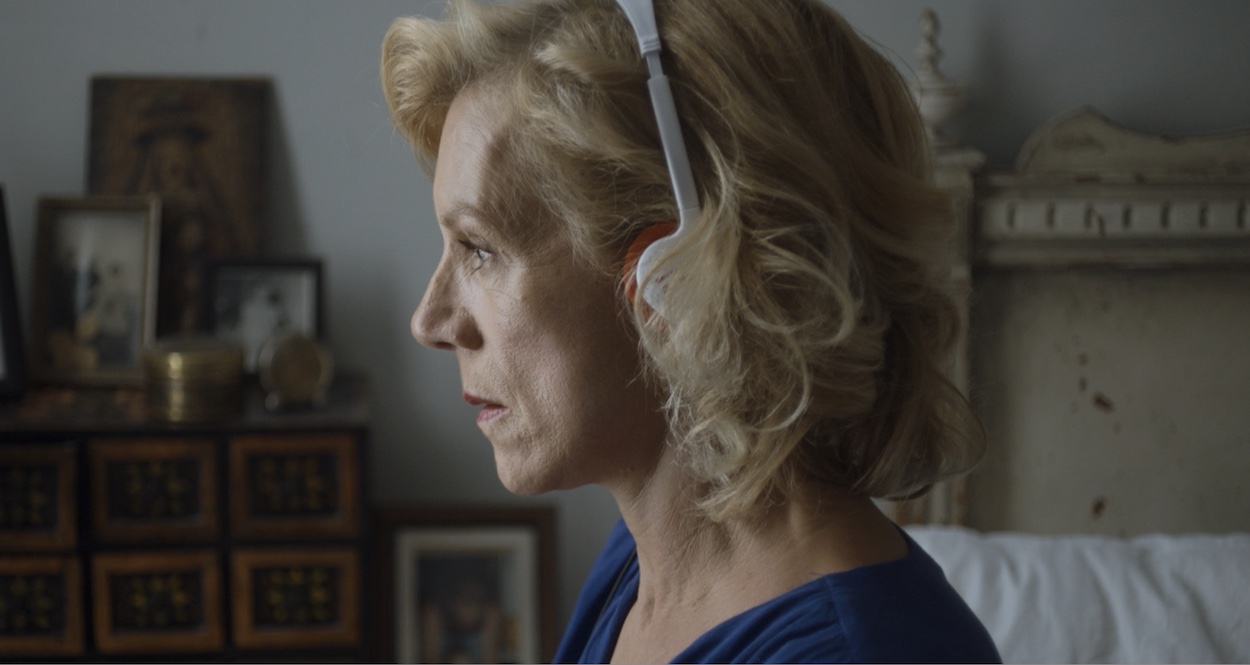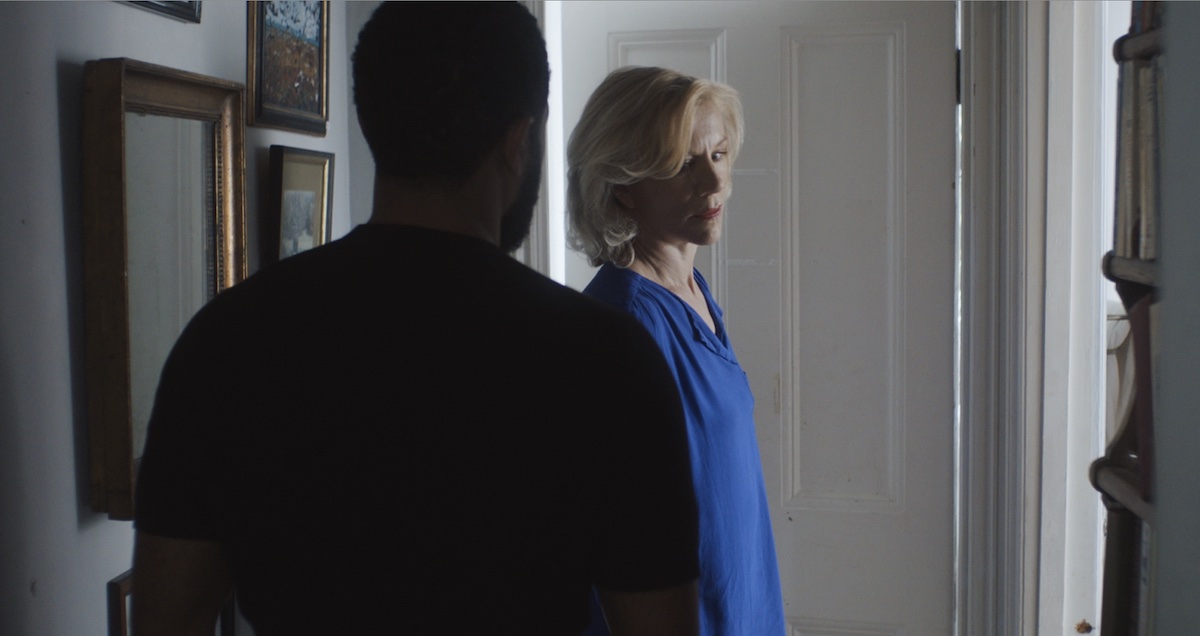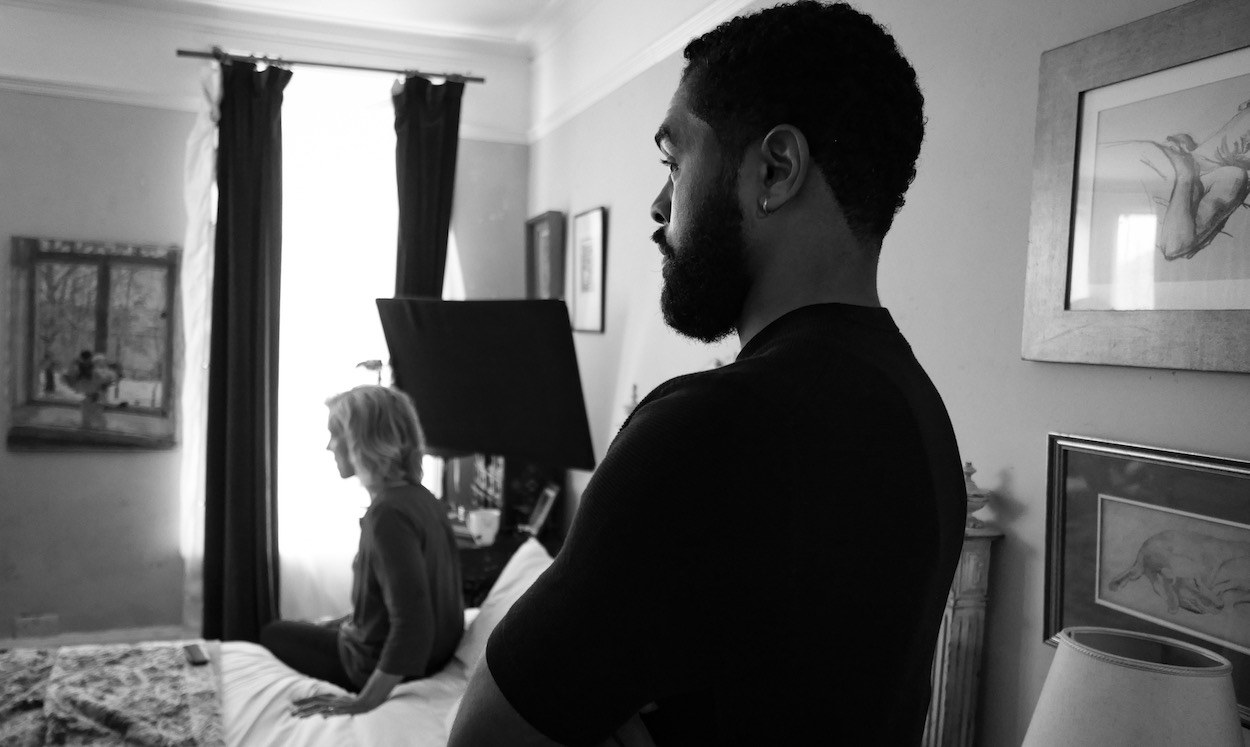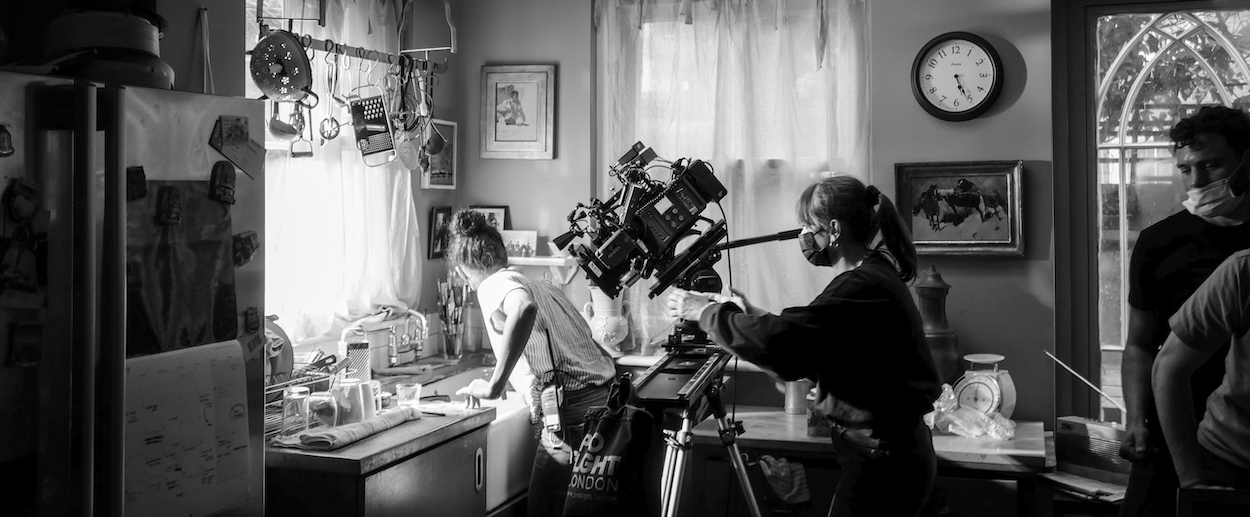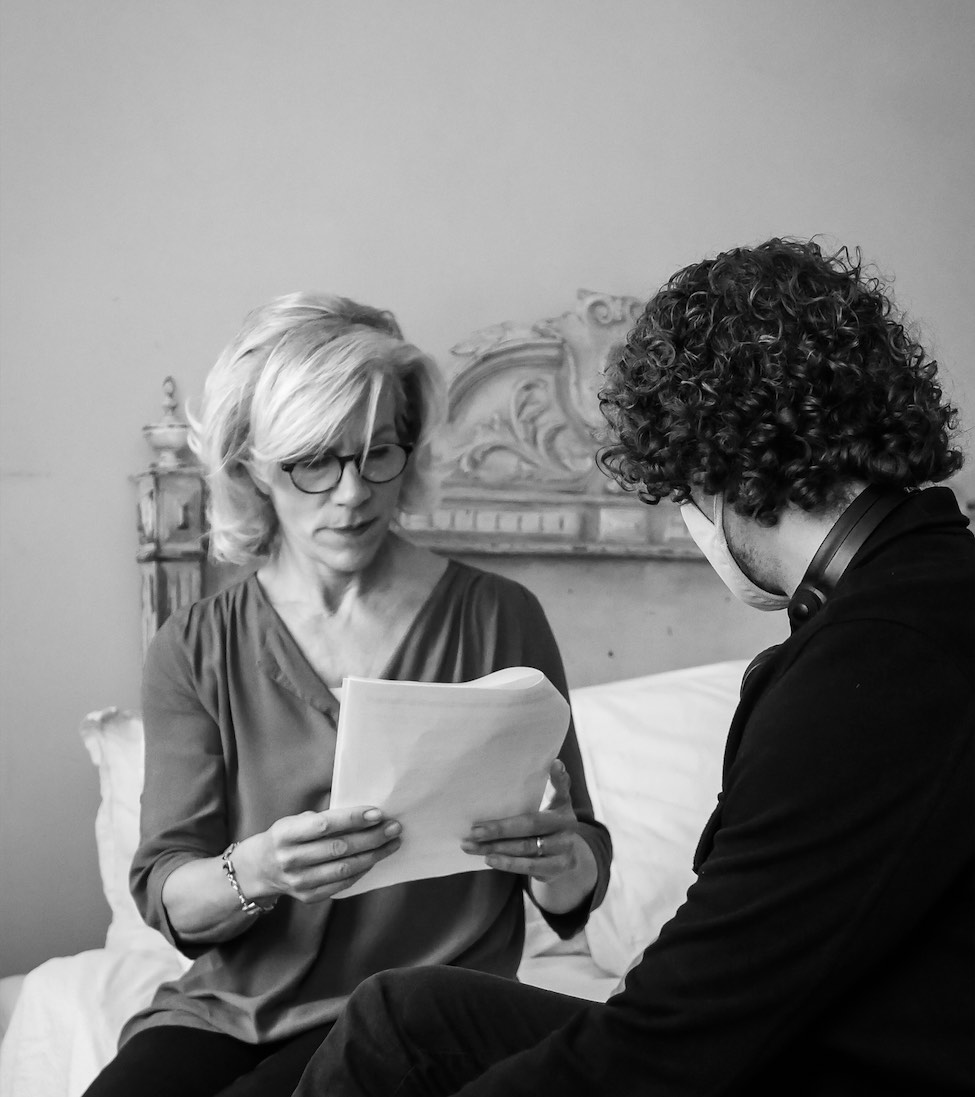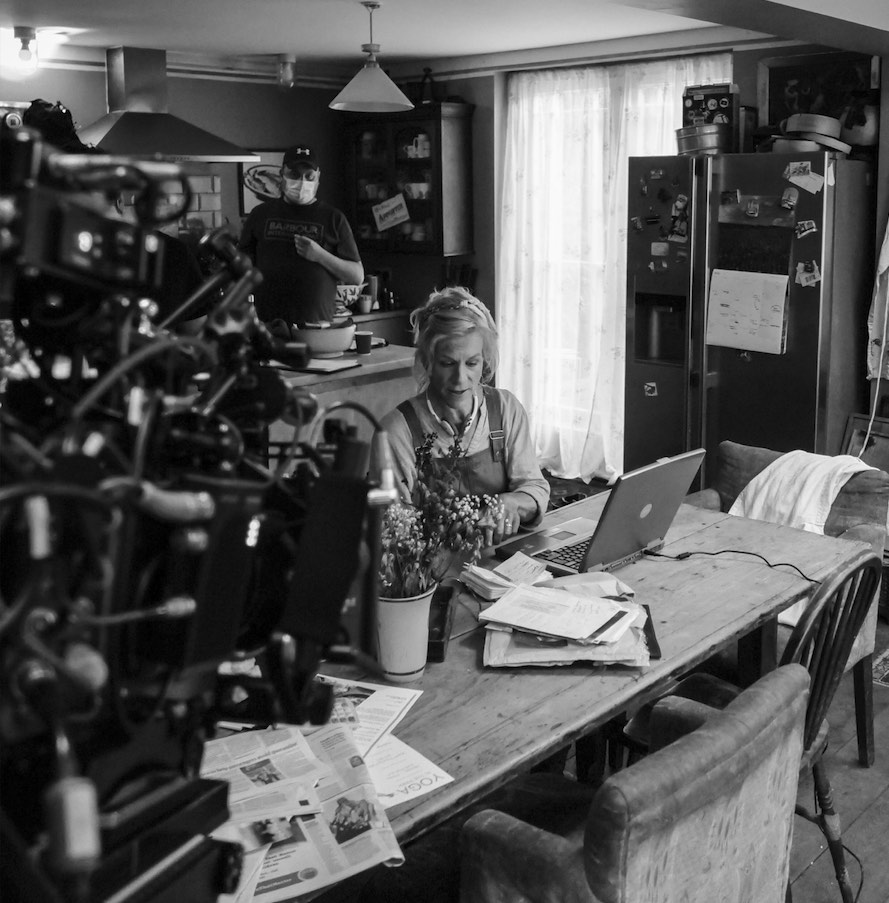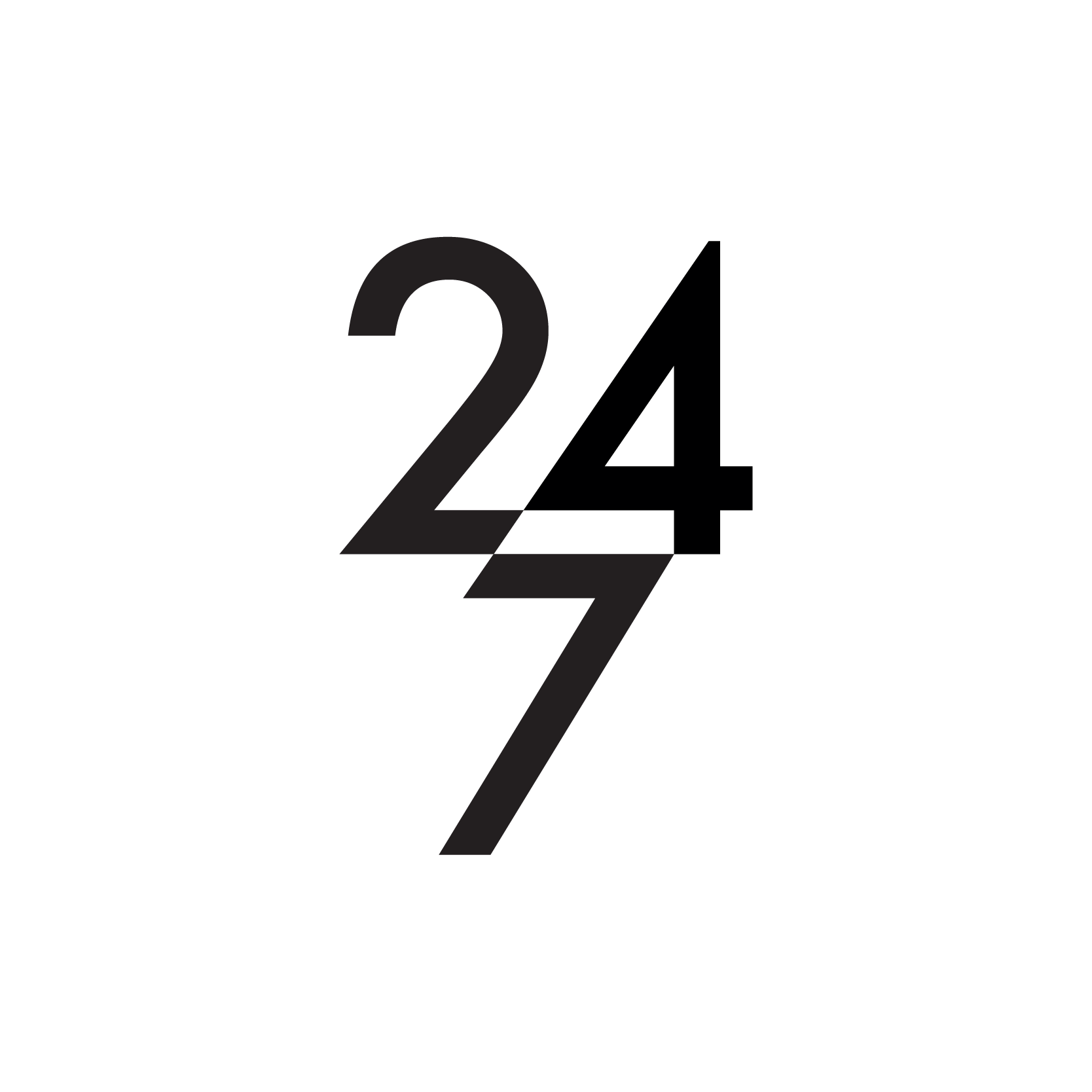Your film is a wonderful interrogation of the sharing of personal grief, through a bizarre yet poignant suggestion that one might turn to an escort service to help bury your husband’s body. How did you arrive at your idea for this film?
The idea sparked from an experience I had some years ago, when on the day after my grandfather had passed, I saw my late grandmother standing on the porch, facing away from me. I couldn’t see her facial expression or what she was looking at. I just watched her for a moment, trying to understand what she might be feeling or thinking about. I hovered for a bit, thinking about this idea of living almost your entire life with someone, then one morning, you wake up and they’re gone.
That was a while ago, but I kept thinking not necessarily about all the heavy emotions surrounding grief and trauma, but more about the mundane and otherwise overlooked details. Like, what happens to your routine? Do you go back to doing things normally or do things change because the person you did it with isn’t there anymore? Do people turn to banal tasks and chores as a means of avoiding closure?
Behind the scenes, Juliet Stevenson and Anthony Welsh, Walls Like Windows
What’s been your route into directing so far? What’s your earliest memory of filmmaking?
I didn’t grow up with my dad’s Super 8 shooting films with my friends in the backyard or anything like that. It’s quite a boring answer, but I just watched a ton of films and TV as a kid. Like way too much. When I was about 7, I’m pretty sure I watched Hercules (the Disney one) every day for a year straight… Wasn’t the most popular person in the house, but I had a knack for procrastinating by way of watching too much stuff.
Eventually, I got curious. I wanted to know how to make the films I was watching on TV. So, in class, I volunteered to make my essays and presentations into short video clips that I’d edit together with ripped music from the internet. These poor kids in class would have to sit through a 4-minute video of why mountain gorillas in the Congo are endangered, along with a Moby soundtrack (I’m still repenting for that)… That was my first memory of filmmaking really.
After university, I ended up working as a runner at a London production company. I kept trying to assist the treatment designer in between odd jobs, and eventually (after loads of YouTube tutorials and some terrible treatment samples) I decided to go freelance. As a researcher and treatment designer, I got to work with some really amazing directors, from whom I learned so so much.
I took a leap of faith in myself and jumped into the deep end to make my own work. That led to my first short Winter Coat. It was such an incredible experience. We put that film together on a shoestring budget, running around London, asking people if we could film in their stores for free. It was essentially just me and some friends figuring things out as we went. After that, though, I was obsessed.
In all of your work, it’s clear you have a real grasp of the subtle ways in which humans connect with and rely on each other, and you offer special insight into the nuances of non-romantic love. Tell us a bit about why these platonic connections fascinate you so much. Are you much of a people-watcher?
100%, but who isn’t!? People are fascinating. I’m not entirely sure why I’ve gravitated towards those kinds of details and connections though… it’s quite a subconscious experience. But I am aware that my work so far has routinely examined ‘non-romantic’ love.
I definitely have an affinity for stories that explore how love can be expressed, aside from traditionally romantic connotations.
For example, I left home at 16 to try and play basketball at a school in the US. Despite not being nearly good enough, it was an incredible privilege to have been able to chase that naive dream. However, it meant I was a lot further from home than I was accustomed to, which inevitably lead to a time when I really struggled to find people I could relate to or properly talk to about my mental health. From that experience, I realised what an incredibly big role a complete stranger can play in one’s life. For a long time, I relied on the kindness of strangers – people who eventually became significant figures in my upbringing. So perhaps my habit of observing people and the ways in which we communicate stemmed from my experiences away from home.
You’ve said that you initially struggled to avoid satire in writing this piece, despite the theme of grief. The result offers us a wonderfully bizarre and complex interrogation of the intimacy of losing a loved one. Tell us a bit about exploring that grey area between comedy and tragedy.
The script started off as a satire because I wanted to write something that felt more light-hearted and refreshing than the usual dramatically leaning scripts I was writing at the time. However, as the script progressed, I kept pulling back the comedic elements to make the decisions and characters more organic. In doing so I ended up trying to balance the line between comedy and tragedy, it’s more realistic to how we actually experience things. I was also heavily influenced by Anthony (Welsh) and Juliet (Stevenson) in pre-production. They both had a lot of questions about the characters and plot, which really helped steer the film in a direction that made it more believable.
It truly feels like a stage play, with its three dramatic unities of space, time and action. Did this feeling of dramaturgy influence how you approached the project? Did you have a chance to rehearse with your cast ahead of the shoot?
Before I even started writing the script, I knew I wanted to make something that was as simple in its form as it could be. I wanted to limit the story to take place over one day, in one location, with as few actors as possible. I find those kinds of constraints to be really helpful in forcing me to be more creative.
I wanted to use Anthony and Juliet’s background and experience in theatre to our advantage. We needed to rehearse, but as we didn’t have an endless budget, we had to make do with only one rehearsal session. I was so thankful we were able to do it though because in studying and experimenting with the things we had in the script, we were able to figure out what worked, what didn’t, and what eventually we would need to do on the day to make the film we wanted.
You’ve talked before about having Juliet Stevenson and Anthony Welsh in your mind when preparing this film – in what way were you drawn to them as your Maggie and Leon?
I was drawn to them, because in roles that they’ve played in the past, they were able to draw out such subtle and nuanced performances, no matter the format or genre. I can be a bit melodramatic in real life, not going to lie…which is probably why I gravitate towards actors and performances that do the exact opposite. So when I was writing the film and thinking about actors that I could use as a way to inspire the characters in the script, I just married myself to the idea that it would be them, without thinking about it too much. They just made sense.
Having now directed them both, is there any advice you would give your past self?
I thought that given how long I’ve been directing, versus how long Anthony and Juliet have been acting, it would be stupid of me to not be collaborative and open-minded in how we worked with one another. I learned so much from them both, it was ridiculous. Thanks to them, I had a masterclass in directing and working with actors. So my advice to my past self is the same advice I’m hoping I’ll continue to remember – listen, and learn as much as you can because you don’t know shit.
The final scene at the front of the house communicates so much in spite of (or perhaps because of) the lack of any dialogue. Tell us a bit about how you and the cast approached this beautifully silent scene.
Throughout the whole process, we constantly spoke about the physicality of the story. I was often keen to drop lines of dialogue if there was a way for us to communicate through movement or physical touch. I wanted the lack of dialogue at the end of the film to open up some intimacy between Anthony and Juliet’s characters, allowing the subtlety of their performances to carry the subtext and emotion of the scene.
What’s next for you? Anything else you’d like to mention?
I’m currently in pre-production on another short film that we’ve been developing since 2022. The scale and complexity of the story are quite a jump up from anything I’ve done before, so I’m seriously excited about it. In January we found out that it was shortlisted for the BAFTA Rocliffe New Writing Competition, so we’ve used the momentum from that to really kickstart things. We’ve got an amazing team together and are planning on shooting in the summer. Alongside that, I’m really interested in exploring the music video and commercial world more. Both are formats I really want to dive into further. So all in all, I just want to keep writing and making things.
Interview by Becca Nichols
Werner Vivier website
@werner_vivier
Walls Like Windows
Written & Directed by Werner Vivier
Executive Producers - Kristina Epenetos, Helen Hadfield, Morgan Clement, Dom Thomas, Celine Cotran
Producers - Oliver Sunley, Rosa Junkovic
Production Companies - C24 Films, Mental Images, Snapper Films, Object & Animal
DOP - Lorena Pagès
Editor - Owen O’Sullivan
Composer - Andrea Boccadoro
Sound Designer - Tim Obzud
Production Designer - Grace Taylor
Colourist - Paul Harrison
Casting Director - Sarah Wilson
1st AD - Ben Wicks
2nd AD - Sarah Culverhouse
Floor Runner - Magda Gorczynska
COVID Supervisor - Nina Durban
Script Supervisor - Cottia Thorowgood
Focus Pullers - Stephen Glass, Marco Alonso Monedero
2nd AC/DIT - Joe Salkey
Gaffer - Krunal Saadrani
Spark - Anna Brookes-Beckman
Phillip - Stephen Saunders
Sound Recordist - Jonny Stothert
Art Department Runner - Lucy Ashmore
Stills Photographer - Will Needham
Costume Designer - Cristiano Casimiro
H/MUA to Juliet Stevenson - Susanna Peretz
H/MUA to Anthony Welsh - Freda Ellis
Location Management - Creative Location
Catering - Red Hot Box
Production Transport - Daniela Chivulescu
Camera Hire - 24/7 Drama
Lighting - ProLight
Edit House - Marshall Street Editors
Colour Grade - Freefolk
Poster/Title Design - Sean Steed
Production Accounting - Brown McLeod
Production Accountants - Gemma Sak, Adam Betts
